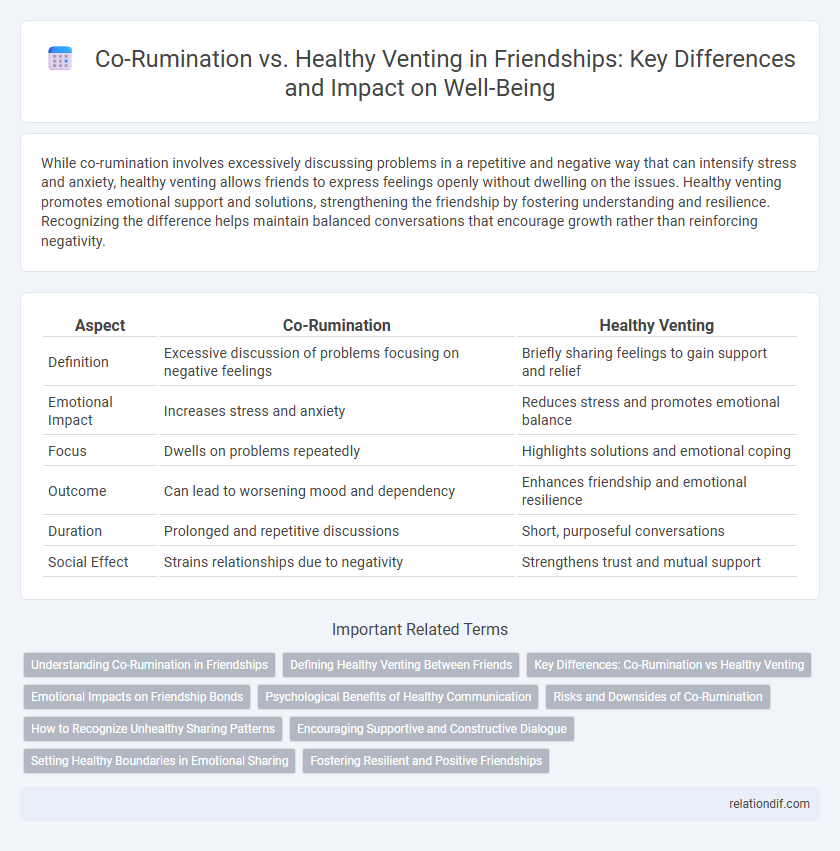While co-rumination involves excessively discussing problems in a repetitive and negative way that can intensify stress and anxiety, healthy venting allows friends to express feelings openly without dwelling on the issues. Healthy venting promotes emotional support and solutions, strengthening the friendship by fostering understanding and resilience. Recognizing the difference helps maintain balanced conversations that encourage growth rather than reinforcing negativity.
Table of Comparison
| Aspect | Co-Rumination | Healthy Venting |
|---|---|---|
| Definition | Excessive discussion of problems focusing on negative feelings | Briefly sharing feelings to gain support and relief |
| Emotional Impact | Increases stress and anxiety | Reduces stress and promotes emotional balance |
| Focus | Dwells on problems repeatedly | Highlights solutions and emotional coping |
| Outcome | Can lead to worsening mood and dependency | Enhances friendship and emotional resilience |
| Duration | Prolonged and repetitive discussions | Short, purposeful conversations |
| Social Effect | Strains relationships due to negativity | Strengthens trust and mutual support |
Understanding Co-Rumination in Friendships
Co-rumination in friendships involves excessive discussing and revisiting of problems, which can amplify stress and negative emotions between friends. Healthy venting allows individuals to express feelings constructively while fostering support and emotional relief without deepening distress. Recognizing the difference between co-rumination and healthy venting is crucial for maintaining balanced, supportive friendships that promote psychological well-being.
Defining Healthy Venting Between Friends
Healthy venting between friends involves expressing feelings openly while maintaining mutual respect and emotional boundaries, avoiding repetitive negative discussions that exacerbate stress. Unlike co-rumination, which often intensifies anxiety and fosters negativity by dwelling on problems, healthy venting promotes constructive support and problem-solving. Establishing clear communication and balancing empathy with positivity strengthens friendship resilience and emotional well-being.
Key Differences: Co-Rumination vs Healthy Venting
Co-rumination involves repetitive, negative discussion of problems that often intensifies emotional distress and hinders problem-solving, while healthy venting allows friends to express feelings briefly and gain perspective, promoting emotional release and support. Co-rumination can lead to increased anxiety and depression by reinforcing negative thought patterns, whereas healthy venting encourages constructive feedback and emotional regulation. Understanding these key differences helps maintain balanced friendships that foster resilience and well-being.
Emotional Impacts on Friendship Bonds
Co-rumination, characterized by excessive rehashing of problems, intensifies emotional distress and can strain friendship bonds by fostering negativity and dependence. In contrast, healthy venting promotes emotional relief and mutual understanding, strengthening trust and resilience within friendships. Maintaining balanced communication enhances emotional support while preventing relational burnout.
Psychological Benefits of Healthy Communication
Healthy communication in friendships fosters emotional resilience and reduces stress by allowing individuals to express feelings without dwelling excessively on negative thoughts. Unlike co-rumination, which can intensify anxiety and depression, venting in a constructive way promotes problem-solving and strengthens social support networks. Psychological benefits include improved mood regulation, enhanced trust, and a greater sense of connection, which contribute to overall mental well-being.
Risks and Downsides of Co-Rumination
Co-rumination involves excessive discussion of problems and negative emotions, which can heighten stress and reinforce anxiety or depressive symptoms among friends. This pattern fosters emotional exhaustion and may deteriorate mental health rather than providing genuine relief. Unlike healthy venting, co-rumination traps individuals in repetitive negative thoughts without promoting constructive solutions or emotional growth.
How to Recognize Unhealthy Sharing Patterns
Unhealthy sharing patterns in friendships often involve co-rumination, where repetitive discussions of problems amplify stress rather than provide relief. Signs include constant dwelling on negative topics, inability to shift conversations toward solutions, and feelings of emotional exhaustion after interactions. Recognizing these patterns involves observing whether the exchange fosters support and growth or perpetuates anxiety without constructive outcomes.
Encouraging Supportive and Constructive Dialogue
Co-rumination involves excessively discussing problems without seeking solutions, often intensifying negative emotions and stress in friendships. Healthy venting encourages open expression of feelings while promoting problem-solving and mutual understanding, fostering resilience and emotional support. Encouraging supportive and constructive dialogue strengthens trust and empathy, helping friends navigate challenges together in a positive, growth-oriented manner.
Setting Healthy Boundaries in Emotional Sharing
Setting healthy boundaries in emotional sharing fosters trust and prevents co-rumination, which often amplifies stress and negative emotions in friendships. Limiting repetitive discussions about problems encourages constructive venting, allowing friends to support each other without becoming overwhelmed. Prioritizing balance between empathy and emotional independence strengthens relational resilience and promotes mental well-being.
Fostering Resilient and Positive Friendships
Co-rumination involves excessive discussion of problems that can amplify stress and negatively impact mental health, while healthy venting allows friends to share feelings constructively and seek support without dwelling on negativity. Fostering resilient and positive friendships relies on balancing emotional openness with solutions-focused conversations that promote growth and mutual understanding. Friends who engage in healthy venting cultivate trust and emotional strength, enabling them to navigate challenges without reinforcing anxiety or depressive patterns.
co-rumination vs healthy venting Infographic

 relationdif.com
relationdif.com